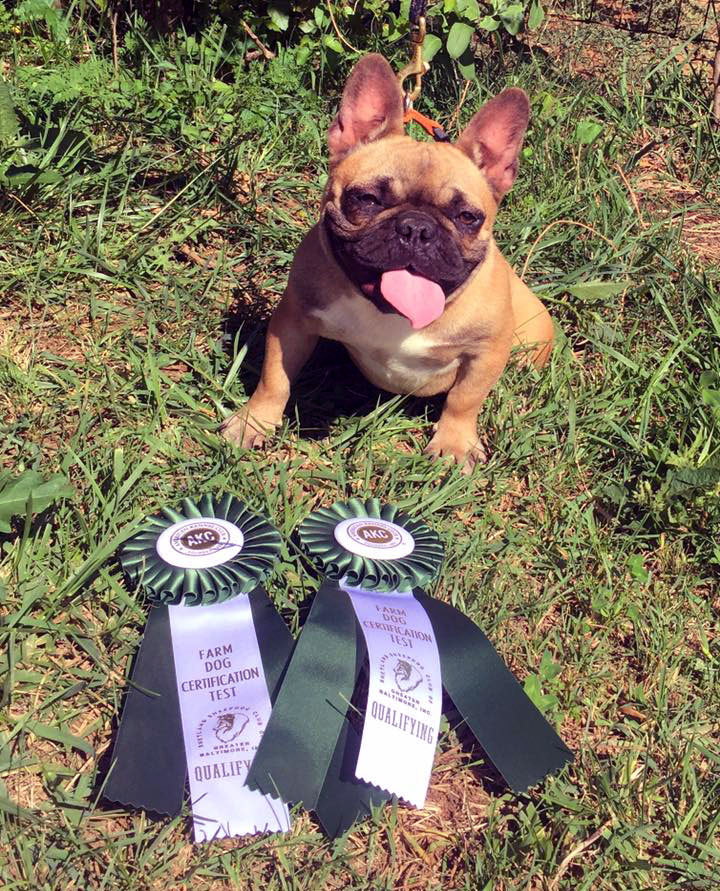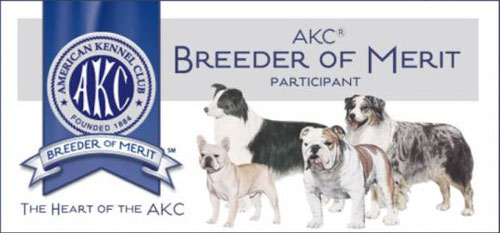About French Bulldogs
The French Bulldog is a companion dog. The breed is small and muscular with heavy bone structure, a smooth coat, a short face and trademark bat ears. Prized for its affectionate nature and balanced disposition, they are generally active and alert, but not unduly boisterous. Frenchies can be brindle, fawn, white, cream, piebald and red.
Brief History
In the latter part of the 19th century, the lace makers of Nottingham, England, began selectively breeding a smaller toy Bulldog as a lap pet. Displaced by the Industrial Revolution, many of the lace makers crossed the English Channel, taking their small bulldogs with them to France.
Some of these toy or miniature bulldogs made their way to Paris, where well-to-do Americans on the Grand Tour of Europe saw them and began bringing them to the US. In 1897, the French Bull Dog Club of America was formed, the first club in the world dedicated exclusively to the welfare of this wonderful breed.

Breed Standards
Temperament: Adaptable, Playful, Smart
Height: 11-13 inches
Weight: under 28 pounds
Life Expectancy: 10-12 years
Group: Non-Sporting Group
Grooming
The Frenchie's short coat sheds minimally. Weekly brushing with a medium-bristle brush, a rubber grooming mitt or tool, or a hound glove will help to remove shed hair and keep him looking his best. Brushing promotes new hair growth and distributes skin oils throughout the coat to help keep it healthy. A Frenchie's facial folds should be kept clean and dry. The Frenchie's nails should be trimmed regularly, as overly long nails can cause him pain.
Exercise
A short walk or outdoor play session with their owner each day should provide enough exercise to keep the French Bulldog in shape. Frenchies enjoy participating in canine sports such as obedience, agility, and rally. As a flat-faced breed, however, they are prone to breathing difficulties and should never be allowed to exert themselves in hot or humid weather.
Training
Early socialization and puppy training classes are recommended. Exposing the puppy to a wide variety of people, places, and situations will help him develop into a well- adjusted adult. Puppy training classes serve as part of the socialization process, promote good behavior, and help the owner learn to recognize and correct bad habits. Frenchies have big personalities and can need a fair amount of training to make them civilized companions. They can be stubborn, but at heart they're people pleasers and therefore easy to train. The proper motivation (such as food) and making a game of the process will ensure their cooperation.
A crate trained puppy is easier to housebreak. A dog regards its crate as its den, a safe haven and home. If you travel, the dog is safest in his crate in your vehicle and also when you stay in hotels or visit other people. If he should be ill or injured and need to be kept quiet, this is much easier if he is happy in a crate. In warm areas, cooling pads and fresh water should be placed in the crate too.
You should take your French Bulldog to training classes as soon as your veterinarian feels he has proper immunity This will get him accustomed to being around other dogs and people, will teach you how to communicate your wishes to him, and will teach him such basics as walking well on a lead, sitting, staying, and coming on command. Although cute and cuddly-looking, a French Bulldog has a big personality and needs an adequate amount of training to make it a civilized companion.
Contrary to the stereotype as stubborn , most Frenchies strive to please their owners and are therefore very trainable with the proper motivation (usually food). There are now many French Bulldogs who compete very successfully in obedience, rally, agility, and a few have even done field work (tracking, coursing, herding). They can also be excellent working dogs in all kinds of Therapy Dog roles in volunteer settings such as schools, nursing homes and hospitals.
Considerations with Children
Children like dogs and Bulldogs are great with children. However, they both need to learn how to get along with each other. Never leave young children with unsupervised dogs. Both can be injured as a result of not understanding that dogs are not people and that people are not dogs. As mentioned above, a dog may need to learn not to defend its food from children. Children need to learn that the dogs don't understand what they are saying and won't listen to what they are told at a young age. Impulsive behavior by both children and dogs can lead to problems and potential injury. Be sure to adequately supervise their interaction until they both understand how they should interact.
Health
Find a good veterinarian, preferably one who has other short- faced patients; and provide your Frenchie with regular checkups, routine vaccinations, tests for intestinal parasites, heartworm prevention, and flea and tick control. Your vet should do regular dental checkups and care, and you should clean your dog's teeth regularly at home as well.
As a short-faced and dwarf breed, French Bulldogs may have some health concerns that you should be aware of. The short face can make their breathing less efficient than that of long-nosed breeds, so Frenchies have less tolerance of heat, exercise, and stress - all of which increase their need to breathe.
Keep your French Bulldog cool in warm weather, and avoid strenuous exercise. If your dog seems to overheat or become stressed too easily, with noisy breathing and sometimes spitting up foam, consult the vet and have its airway evaluated for pinched nostrils or an elongated soft palate. Anesthesia is also more risky in short-faced dogs, so be sure your veterinarian is experienced with such breeds should your Frenchie need to be anesthetized for any reason.
General Care
French Bulldogs don t require a lot of grooming and generally do well in small living quarters. They are not noisy and most of them are very fond of people, though there are individual differences in how well they get along with other animals. They should never be allowed to run free, and should only be allowed outdoors in a fenced yard or on a leash. French Bulldogs must never be left unattended around water, as they are poor swimmers and can easily drown due to their front-heavy structure.
French bulldogs do best in moderate temperatures and should be carefully supervised in both high and low temperature ranges. Panting or shivering are both indications of excessive exposure. In warm climates or humid environments, (over approximately 70 F), air conditioning in the house and car are a must! Indestructible dog toys are best, as those powerful bulldog jaws can destroy less durable ones; and rawhide type chews should not be used because when they soften they can become lodged in a Frenchie's throat.
Occasional brushing keeps the coat shiny, and regular nail trimming is a must since many dogs don t usually wear their nails down by running. Regular cleaning of the ears and of the deep facial folds will prevent these sensitive areas from becoming irritated, and regular checking of the anal sacs will prevent problems with these. Your vet can advise you on how to care for the ears, skin folds, and anal sacs as well as on feeding your puppy. It is important that dogs be kept at an appropriate weight; an obese French Bulldog is at a far higher risk for many of the breed's health issues.

